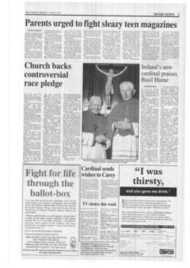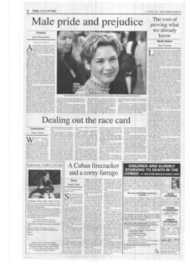Page 6, 27th April 2001
Page 6

Report an error
Noticed an error on this page?If you've noticed an error in this article please click here to report it.
Tags
Share
Related articles
Baroness Cumberledge To Lead Review Of Nolan Child...
How Often Do The Media Bear False Witness?
Importance Of The Nolan Report
How To Turn Nolan Into Practical Common Sense
Lives Remembered
I t is a fair bet that for much of the
media the Nolan Review was a deeply disappointing document. Accustomed to the flurry of hideous revelations that most inquiries into child abuse customarily unearth, it had to be content with a series of dry structural recommendations aimed at prevention.
Predictably it turned to past scandals and current litigants to create a sense of the dark crisis that lay behind the call for the Church to become a beacon of excellence in child protection.
But the review was never intended to be an inquisition on the lines of the Waterhouse inquiry into abuse in children's homes in North Wales. Wisely, it limited itself to the bare bones of how improved procedures might preclude the oversights which have allowed abuse to occur and remain undetected. In an ideal world, many of the measures recommended would appear likely to do just that, consigning the taints that have damaged the Church and its leaders in the recent past to history.
In reality however, drawing a line under past will not be so readily achieved and there is every reason to believe that a great deal of history will be exhumed within the framework of the reforms.
Concern for the paramount welfare of the child is the guiding light of the Nolan Review. It is not unique in this, rather it echoes the spirit of the Children's Act 1989 as well as the Church's own guidelines on child abuse adopted in 1994. Notwithstanding this, it is a fundamental moral principle that ought to be a building block of civilised life.
Yet it is here that the Nolan Review disappoints. If the panel's recommendations are taken at face value, the welfare of children may not be safeguarded, but be at risk, and with it the future integrity of the Church. For it has adopted a terminology of the presumption of abuse which has proved damaging in the development of child protection over the past decade. This blinkered approach has unwittingly created a vast panoply of false accusations whose existence, cause and effects are routinely denied or minimised.
To the unwary, it may seem pedantic to object to the use of "victim" and "disclosure" for, respectively, complainant or suspected victim and allegation. But it is precisely here that the greatest danger lies. For it creates the expectation that an allegation is true, prior to, or even instead of, an investigation to determine the truth.
When an allegation is founded, precipitate action, such as the suspension of the
alleged abuser, will have been found to be justified. But where it isn't, the insulation of implied or explicit belief creates a straightjacket for the accuser who may be increasingly propelled into making progressive allegations to counter the fear of being exposed as having lied.
This trap does not merely ensnare the child, but many of the professionals charged with the investigation of the allegation and those providing support. Schooled in the mistaken belief that an increasingly distressed complainant making progressive allegations must necessarily be the victim of yet more undisclosed abuse, they all too often invest their time and energy in shoring up, rather than testing, the allegations. The situation is exacerbated where the allegations are retrospective and made by adults.
The perception of the Church as a potential haven for paedophiles and sadists is informed by what is feared to have occurred in the past. The shameful existence of some cases, the handling of which, with hindsight, seems both grossly nave and inept, lays the Church open to allegations of overlooking even more serious cases, though paradoxically cases tend to escalate in seriousness the more remote the time they were alleged to have occurred, and the more recently they come to light. Given the climate of openness in abuse allegations of the past decade, including those affecting the Church, it ought to be expected that the most serious allegations would surface first, if not detected contemporaneously.
Yet this counter-intuitive pattern of allegations is accepted by most child abuse professionals unquestioningly and contributes to what is commonly understood as the "steep learning curve" others must follow. Support is lent by the sheer volume of allegations in some cases such as police trawls, while in others there is a pre-supposition that hideous abuse routinely occurs on a regular basis without detection until disclosed through therapy, having been hidden not just to the world, but to the consciousness of the accuser.
Most of the major scandals involving the Church so
far have happened elsewhere. There are the major Christian Brothers orphanage cases in Australia and Canada, while Ireland is racked with claims about its former industrial schools. In the USA, a series of cases in the early 1980s resulted in the first wave of major lawsuits. Many more have followed. Cases involving the Catholic Church are given disproportionate prominence by the political tensions both within and without the Church. Almost invariably these scandals are linked to major compensation claims, but the extent to which this is a lubricant for exaggerated or invented allegations is rarely acknowledged.
Yet evidence exists that the lure of compensation may be both an end and a means of the gross fabrication of accusations against institutions. In a case in Nova Scotia the conviction of a care worker for a handful of claims led to the setting up of a openhanded-compensation state fund, predicated on the expectation of a number of other cases. In the event, the number of complainants reached an astonishing 1,457 implicating 337 current and former employees. By the time it was brought to a halt, $39 million had been paid out — without a single prosecution against any of those implicated.
But even more extraordinary was that the local justice department set up an independent review, staffed by experienced orthodox police investigators. It was charged to look at the culture of abuse in homes in the past and present. Its findings are an object lesson into how a retrospective investigation should be monitored.
Through rational analysis of the claims projected against the documented facts and the influences on the claimants, it concluded that the vast majority were false. it further noted those brought with the assistance of the same personal injury lawyers were both the most florid and bore evidence of cross-contamination of claims masquerading as similar facts.
Because it documents the process of the systematic production of false allegations, the international significance of the report is beyond doubt. Yet the political will and that of the claimants was to suppress it. Only through local media pressure and defence lawyers did an edited version appear. In the current climate, it is unlikely that this report will make a deep impression on child protection professionals, even if they were to have access to it.
The same fate awaited the 1989 Nottingham Joint Enquiry Report into an alleged satanic abuse network. Its suppression opened the way for the Rochdale and Orkneys ritual abuse fiascos and by the time the dawn raids were stopped, misinformation on the nature and extent of organised or institutional abuse had become systematised into the government guidelines and eventually the working practices of police and social services child abuse investigators.
This is the danger of an uncritical acceptance of the Nolan recommendations. By handing over responsibility for a national protective framework, including a central database on employees and clergy past and present, to child protection professionals. however well-intentioned, the Church may find itself held to ransom through systematic presumptions and flaws that obscure rather than reveal the truth. And the truth is, after all, not just the best safeguard of the welfare of children, it is also the averred foundation stone of the Church.
Margaret Jervis is the legal affairs adviser of the British False Memory Society 11 right", said the man who had barged into the rather earnest conversation I was having with a fellow Catholic at a party just after Easter. "The Pope has been a wonderful leader for you Catholics. But just what effect, has he had on other people in this country'?"
It was such an unexpected question that I paused, wondering where to begin. The conversation took another turn, and soon my questioner and I drifted apart. As I bid our hostess farewell, he gave me a friendly wave which suggested that he would still have liked an answer. So in preparation for the next time I am asked, here is my attempt.
Since my questioner did not want to hear more about John Paul's significance for ordinary Catholics like myself, I would begin by recalling the effect that the elevation of Cardinal Wojtyla had on the Poles among whom Hived in West London. Suddenly they were no longer embarrassing leftovers from the Second World War; the old men of their long exiled government stirred with new energy in the realisation that they might achieve their dream of handing over to a democratically elected government in Poland.
But of course the new Pope's inspiration quickly extended into Poland through the Solidarity strikers at the Gdansk shipyard. When he forced the Polish communist authorities to permit him to make a visit home, the resulting fissure of national feelings brought the entire Soviet empire crashing to the ground.
The removal of the threat of nuclear holocaust has led to the reunification of Germany and the European Union's surge of self-confidence which has led it to indicate that it no longer desired American military, support, events that have be been of enormous significance for Britain, sometimes in unexpected ways. Our government was delighted at the opportunity to reduce its armed forces as part of a "peace dividend", but the public has grown uneasy at the Ell's growing superpower ambitions.
Whatever their prejudices, Protestants in this country have always been fascinated by papal elections. The election of a non-Italian for the first time in 455 years stirred a keen interest that led to the Pope, already one of the most famous people in the world, arriving here just before the Falklands War. There were a few mutterings, but the Vicar of Rome demonstrated that, contrary to traditional prejudice, he was no obscurantist priest but a man of powerful spiritual and humane qualities. Even my step-grandmother, the daughter of a staunch Northern Ireland clergyman who. I suspect, regarded my Catholicism as a crown of thorns, was electrified by his personality.
The papal effect can be measured by the fact that the popular assumption that religion is destined to be extinguished by the competing forces of capitalism and socialism has vanished. Although John Paul has primarily inspired Catholics to resist the triumphant liberal drift of soci: ety since the Sixties his leadership against a supine acceptance of the march of abortion, euthanasia and cloning has influenced people of all religions.
Perhaps most surprising, he has woken people to the power of culture, a concept that traditionally makes the British uneasy. When he fuelled the determination of Eastern Europeans to demand the freedom to enjoy their cultural inheritance he showed that, whatever the strength of technical, political or military power, imbedded cultures will not be shifted, Both the Crown and and the continuing imperial links seem all the stronger in the light of this.
David Twiston Davies works for The Daily Telegraph
blog comments powered by Disqus













